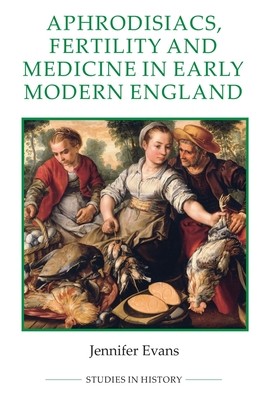
- We will send in 10–14 business days.
- Author: Jennifer Evans
- Publisher: Royal Historical Society
- ISBN-10: 0861933508
- ISBN-13: 9780861933501
- Format: 15.6 x 23.4 x 1.2 cm, minkšti viršeliai
- Language: English
- SAVE -10% with code: EXTRA
Aphrodisiacs, Fertility and Medicine in Early Modern England (e-book) (used book) | bookbook.eu
Reviews
Description
An investigation into aphrodisiacs challenges pre-conceived ideas about sexuality during this period.
It was common knowledge in early modern England that sexual desire was malleable, and could be increased or decreased by a range of foods - including artichokes, oysters and parsnips. This book argues that these aphrodisiacs wereused not simply for sexual pleasure, but, more importantly, to enhance fertility and reproductive success; and that at that time sexual desire and pleasure were felt to be far more intimately connected to conception and fertilitythan is the case today. It draws on a range of sources to show how, from the sixteenth to the eighteenth centuries, aphrodisiacs were recommended for the treatment of infertility, and how men and women utilised them to regulate their fertility. Via themes such as gender, witchcraft and domestic medical practice, it shows that aphrodisiacs were more than just sexual curiosities - they were medicines which operated in a number of different ways unfamiliar now, and their use illuminates popular understandings of sex and reproduction in this period. Dr Jennifer Evans is a Lecturer in Early Modern History at the University of Hertfordshire.EXTRA 10 % discount with code: EXTRA
The promotion ends in 23d.20:08:31
The discount code is valid when purchasing from 10 €. Discounts do not stack.
- Author: Jennifer Evans
- Publisher: Royal Historical Society
- ISBN-10: 0861933508
- ISBN-13: 9780861933501
- Format: 15.6 x 23.4 x 1.2 cm, minkšti viršeliai
- Language: English English
An investigation into aphrodisiacs challenges pre-conceived ideas about sexuality during this period.
It was common knowledge in early modern England that sexual desire was malleable, and could be increased or decreased by a range of foods - including artichokes, oysters and parsnips. This book argues that these aphrodisiacs wereused not simply for sexual pleasure, but, more importantly, to enhance fertility and reproductive success; and that at that time sexual desire and pleasure were felt to be far more intimately connected to conception and fertilitythan is the case today. It draws on a range of sources to show how, from the sixteenth to the eighteenth centuries, aphrodisiacs were recommended for the treatment of infertility, and how men and women utilised them to regulate their fertility. Via themes such as gender, witchcraft and domestic medical practice, it shows that aphrodisiacs were more than just sexual curiosities - they were medicines which operated in a number of different ways unfamiliar now, and their use illuminates popular understandings of sex and reproduction in this period. Dr Jennifer Evans is a Lecturer in Early Modern History at the University of Hertfordshire.

Reviews